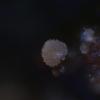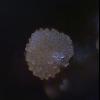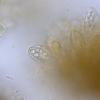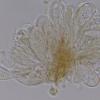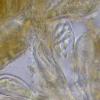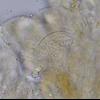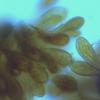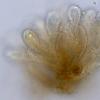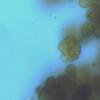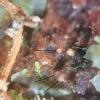
21-01-2026 16:48
Gernot FriebesHi,after my last unknown hyphomycete on this subst

21-01-2026 16:32
Gernot FriebesHi,I need your help with some black dots on a lich

20-01-2026 17:49
 Hardware Tony
Hardware Tony
I offer this collection as a possibility only as e

15-01-2026 15:55
 Lothar Krieglsteiner
Lothar Krieglsteiner
this one is especially interesting for me because

17-01-2026 19:35
Arnold BüschlenHallo, ich suche zu Cosmospora aurantiicola Lite

16-01-2026 00:45
Ethan CrensonHi all, On decorticated hardwood from a New York

18-01-2026 12:24
Hello.An anamorph located on the surface of a thin
Bactridium flavum look-alike with Cephalozia - Denmark
Karen Poulsen,
17-03-2025 19:44
Hi all
I found this very tiny, roundish to cushion-like, pale flesh-colored ascomata with Cephalozia sp. on wood. It consists almost entirely of asci that are thick-walled, 8-spored, reddish brown in Meltzer's. Paraphyses very sparse, filamentous. Spores 1-2-celled, with what must be droplets, approx. 10.5-11.5 x 3 µm. When I saw them, I was sure they were a small version of Bactridium flavum, but the micro showed asci! Does anyone know, what species it could be?
Thank you so much
Karen P.
Zdenek Palice,
17-03-2025 19:58
Re : Bactridium flavum look-alike with Cephalozia - Denmark
It looks like a species of Vezdaea, the asci should be amyloid. But I can see now the asci are not thickened apically, the wall should be even more thicker and the spores are too small for any of described species. So sorry no other idea. Zdenek
Karen Poulsen,
17-03-2025 20:27
Re : Bactridium flavum look-alike with Cephalozia - Denmark
Thank you very much :-)
Karen P.
Karen Poulsen,
17-03-2025 23:16
Re : Bactridium flavum look-alike with Cephalozia - Denmark
I found a key to Vezdaea https://britishlichensociety.org.uk/sites/default/files/Vezdaeaceae.pdf
The spores of leprosa measure 10–15.5 × 2.5–4 µm and together with my new observations of goniocysters and the paraphysers not surrounding the asci, I think, it might be leprosa. I should have used Lugol in stead of Meltzer's. That could perhaps have shown a blue reaction.
Would leprosa be an option, do you think?
New photos added.
Zdenek Palice,
17-03-2025 23:24
Re : Bactridium flavum look-alike with Cephalozia - Denmark
I think not, leprosa should have distinctly stipitate (synnemata-like) apothecia. It would be nice to find whether goniocysts - algae-like granules (often with spines) occur in surrounding of apothecia on wood or liverworts/bryophytes around. But as I wrote, I am not sure at all, although is is somewhat similar to a Vezdaea it may well be something completely else, all the best. Zdenek
Karen Poulsen,
17-03-2025 23:47
Re : Bactridium flavum look-alike with Cephalozia - Denmark
New photo shows ascomata (black arrows) - and goniocysts with spines (blue arrows).
Thanks for all your help.
Best wishes
Karen
Zdenek Palice,
18-03-2025 00:33
Re : Bactridium flavum look-alike with Cephalozia - Denmark
well, i would not say the blue arrows indicate goniocysts, hard to say, possibly no goniocysts are present in your sample or they are just not focused in your photo. the goniocysts as I know are usually (yellowish) green, 15-20-30-50 um in diam. containing algae tightly ensheathed by hyphae and the projecting pointed hyphae ("spines") are very short (one-two-three micrones , maximum 10(-15) um or so) or they are not developed. they are visible under higher magnificaion in microscope and the spines are not developed in all species. Possibly it is not Vezdaea, who knows ? :) I am sorry if I misled you. Zdenek


